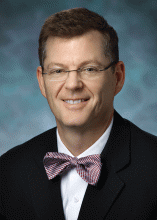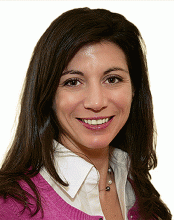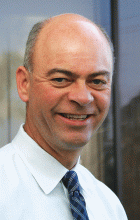User login
SAN DIEGO—Add three more names to the short list of individuals who’ve reached the peak of the specialty. The Master in Hospital Medicine (MHM) designation, introduced in 2010, honors “highly accomplished individuals” who have made major contributions to HM. Twenty-one people have now attained the designation.
Because Eric Howell, MD, MHM, is an introvert by personality and an engineer by training, he knows full well perfection doesn’t exist. But he tries, as evidenced by a résumé that includes being a past SHM president, current SHM board member, perennial faculty member at the society’s annual meeting, and award-winning professor.
“You’re constantly trying to achieve mastery, but no one ever really reaches it,” says Dr. Howell, director of the collaborative inpatient medicine service (CIMS) at Johns Hopkins Bayview Medical Center in Baltimore and chief of its Division of Hospital Medicine. “It’s just good to know that at least I’m viewed by others as being worthy … at least I’m on the right track.
“It’s hard as you become more experienced to find ways to assess your performance, and so getting an award like a Masters is incredibly rewarding because it verifies that your colleagues feel like your work to improve is valid and [has] paid off.”
Tina Budnitz, MPH, MHM, doesn’t see her MHM honorarium as hers alone. Sure, the designation is a nod to accomplishments made over 14 years in multiple leadership roles, including as SHM’s chief strategy and development officer. She helped the nascent specialty craft the “Core Competencies in Hospital Medicine,” design the leadership academies, and launch the now well-established Project BOOST. She developed SHM’s mentored implementation program and the SHM strategic communications plan to help guide the society into 2020.
“As the first non-physician to get this award, I am humbled and honored,” she says. “But what’s most important is the statement being made by SHM that hospital medicine will be propelled forward through the contributions of many professionals including, but not only, physicians. That’s such an important message that I want people to hear.”
Budnitz says SHM is not just a group of individuals.
“The entire team is needed to improve healthcare,” she says.
Gregory Maynard, MD, MSc, MHM, has been a clinician, educator, and quality improvement (QI) pioneer. He helped build and lead mentored-implementation programs to improve transitions of care, upgrade glycemic controls, and prevent venous thromboembolism (VTE).
And now, as chief quality officer at the University of California Davis Medical Center in Sacramento, he is a master.
So why does he still feel like the student and not the teacher?
“What I probably feel best about in hospital medicine is the collaborative approach to mentored implementation, these coaching models to educate broad groups,” he says. “When I’ve had an opportunity to try to work with other hospitalists and mentor them in terms of how to survive as a hospital medicine program or how to attack a problem in quality, be it VTE or something else … they end up teaching me a lot and mentoring me in return.” TH
Richard Quinn is a freelance writer in New Jersey.
SAN DIEGO—Add three more names to the short list of individuals who’ve reached the peak of the specialty. The Master in Hospital Medicine (MHM) designation, introduced in 2010, honors “highly accomplished individuals” who have made major contributions to HM. Twenty-one people have now attained the designation.
Because Eric Howell, MD, MHM, is an introvert by personality and an engineer by training, he knows full well perfection doesn’t exist. But he tries, as evidenced by a résumé that includes being a past SHM president, current SHM board member, perennial faculty member at the society’s annual meeting, and award-winning professor.
“You’re constantly trying to achieve mastery, but no one ever really reaches it,” says Dr. Howell, director of the collaborative inpatient medicine service (CIMS) at Johns Hopkins Bayview Medical Center in Baltimore and chief of its Division of Hospital Medicine. “It’s just good to know that at least I’m viewed by others as being worthy … at least I’m on the right track.
“It’s hard as you become more experienced to find ways to assess your performance, and so getting an award like a Masters is incredibly rewarding because it verifies that your colleagues feel like your work to improve is valid and [has] paid off.”
Tina Budnitz, MPH, MHM, doesn’t see her MHM honorarium as hers alone. Sure, the designation is a nod to accomplishments made over 14 years in multiple leadership roles, including as SHM’s chief strategy and development officer. She helped the nascent specialty craft the “Core Competencies in Hospital Medicine,” design the leadership academies, and launch the now well-established Project BOOST. She developed SHM’s mentored implementation program and the SHM strategic communications plan to help guide the society into 2020.
“As the first non-physician to get this award, I am humbled and honored,” she says. “But what’s most important is the statement being made by SHM that hospital medicine will be propelled forward through the contributions of many professionals including, but not only, physicians. That’s such an important message that I want people to hear.”
Budnitz says SHM is not just a group of individuals.
“The entire team is needed to improve healthcare,” she says.
Gregory Maynard, MD, MSc, MHM, has been a clinician, educator, and quality improvement (QI) pioneer. He helped build and lead mentored-implementation programs to improve transitions of care, upgrade glycemic controls, and prevent venous thromboembolism (VTE).
And now, as chief quality officer at the University of California Davis Medical Center in Sacramento, he is a master.
So why does he still feel like the student and not the teacher?
“What I probably feel best about in hospital medicine is the collaborative approach to mentored implementation, these coaching models to educate broad groups,” he says. “When I’ve had an opportunity to try to work with other hospitalists and mentor them in terms of how to survive as a hospital medicine program or how to attack a problem in quality, be it VTE or something else … they end up teaching me a lot and mentoring me in return.” TH
Richard Quinn is a freelance writer in New Jersey.
SAN DIEGO—Add three more names to the short list of individuals who’ve reached the peak of the specialty. The Master in Hospital Medicine (MHM) designation, introduced in 2010, honors “highly accomplished individuals” who have made major contributions to HM. Twenty-one people have now attained the designation.
Because Eric Howell, MD, MHM, is an introvert by personality and an engineer by training, he knows full well perfection doesn’t exist. But he tries, as evidenced by a résumé that includes being a past SHM president, current SHM board member, perennial faculty member at the society’s annual meeting, and award-winning professor.
“You’re constantly trying to achieve mastery, but no one ever really reaches it,” says Dr. Howell, director of the collaborative inpatient medicine service (CIMS) at Johns Hopkins Bayview Medical Center in Baltimore and chief of its Division of Hospital Medicine. “It’s just good to know that at least I’m viewed by others as being worthy … at least I’m on the right track.
“It’s hard as you become more experienced to find ways to assess your performance, and so getting an award like a Masters is incredibly rewarding because it verifies that your colleagues feel like your work to improve is valid and [has] paid off.”
Tina Budnitz, MPH, MHM, doesn’t see her MHM honorarium as hers alone. Sure, the designation is a nod to accomplishments made over 14 years in multiple leadership roles, including as SHM’s chief strategy and development officer. She helped the nascent specialty craft the “Core Competencies in Hospital Medicine,” design the leadership academies, and launch the now well-established Project BOOST. She developed SHM’s mentored implementation program and the SHM strategic communications plan to help guide the society into 2020.
“As the first non-physician to get this award, I am humbled and honored,” she says. “But what’s most important is the statement being made by SHM that hospital medicine will be propelled forward through the contributions of many professionals including, but not only, physicians. That’s such an important message that I want people to hear.”
Budnitz says SHM is not just a group of individuals.
“The entire team is needed to improve healthcare,” she says.
Gregory Maynard, MD, MSc, MHM, has been a clinician, educator, and quality improvement (QI) pioneer. He helped build and lead mentored-implementation programs to improve transitions of care, upgrade glycemic controls, and prevent venous thromboembolism (VTE).
And now, as chief quality officer at the University of California Davis Medical Center in Sacramento, he is a master.
So why does he still feel like the student and not the teacher?
“What I probably feel best about in hospital medicine is the collaborative approach to mentored implementation, these coaching models to educate broad groups,” he says. “When I’ve had an opportunity to try to work with other hospitalists and mentor them in terms of how to survive as a hospital medicine program or how to attack a problem in quality, be it VTE or something else … they end up teaching me a lot and mentoring me in return.” TH
Richard Quinn is a freelance writer in New Jersey.


